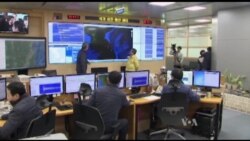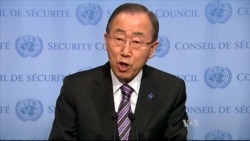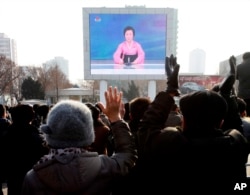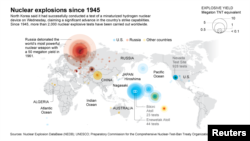The U.N. Security Council said Wednesday that it was working to craft new sanctions against North Korea after its latest nuclear test, while the United States and other world powers voiced skepticism about Pyongyang's claim that the underground blast was a successful test of a hydrogen bomb.
After an emergency session, the Security Council said North Korea's actions posed "a clear threat to international peace and security." The council said the nuclear test was "a clear violation" of previous council resolutions aimed at blocking North Korean leader Kim Jong Un from developing nuclear weapons.
In Washington, the White House sharply criticized North Korea, while also saying that initial U.S. analysis of the blast was "not consistent" with North Korea's boast that it now has hydrogen bomb technology. Such technology would signify a significant boost in the reclusive state's nuclear expertise and power.
National Security Council spokesman Ned Price said in a statement that the U.S. had consistently made clear it would not accept a nuclear North Korea.
"We will continue to protect and defend our allies in the region, including the Republic of Korea, and will respond appropriately to any and all North Korean provocations," Price said.
U.N. Secretary-General Ban Ki-moon said, "This act is profoundly destabilizing for regional security and seriously undermines international nonproliferation efforts. I condemn it unequivocally."
Watch: Related TV report by Margaret Besheer:
Earlier Wednesday, North Korean state television declared, "We've now become a nuclear state that also holds a hydrogen bomb." The statement called the test a matter of self-defense to protect the country's sovereignty, and it made several critical references to the United States.
The U.S. Geological Survey reported a 5.1-magnitude earthquake near Punggye-ri, where North Korea conducted three previous nuclear tests in 2006, 2009 and 2013.
North Korea's Kim said last month that his country possessed a hydrogen bomb. That was widely discounted as an unsubstantiated claim, and Wednesday's test drew the same reaction, since there were indications that it might have been less powerful than Pyongyang's bomb test in 2013. Rand Corporation nuclear analyst Bruce Bennett told VOA he doubted it was a hydrogen bomb being tested.
Yukiya Amano, director general of the International Atomic Energy Agency, said the explosion less than 100 kilometers from the Chinese border was a "clear violation" of Security Council resolutions and "deeply regrettable."
International condemnation
NATO, China and Russia also quickly condemned the test. NATO chief Jens Stoltenberg said the test "undermines regional and international security." Moscow described the test as a "flagrant violation of international law," but its U.N. ambassador, Vitaly Churkin, later called for a "proportionate response."
After North Korea’s third nuclear test in 2013, the U.N. Security Council passed resolutions banning Pyongyang from conducting further nuclear and offensive weapons tests and imposed harsh economic sanctions against the Kim Jong Un regime.
North Korea analyst Shin In-kyun with the Korea Defense Network said Wednesday’s nuclear blast was more powerful than its past nuclear tests. Based on the seismic activity generated, he estimated the bomb produced 40 kilotons of power, significantly more than the atomic bomb that hit Hiroshima, Japan, during World War II.
“The Hiroshima atomic bomb produced 16 kilotons, so North Korea’s nuclear test could have been 2.5 times more powerful than Hiroshima.” Shin said.
Possible North Korea Nuclear Test
Possible North Korea Nuclear Test
Where: The Punggye-ri Nuclear Test Facility, North Korea’s only nuclear test site, located in mountainous terrain in the northeast of the country; has three visible tunnel entrances known as the South Portal, East Portal, and West Portal.
Previous tests: 2006, 2009 and 2013; all at Punggye-ri
Alert: Suspicions of a possible nuclear test were first raised by seismologists who detected a 5.1 magnitude tremor near Punggye-ri. The U.S. Geological Survey said the epicenter of the quake, detected at 10 a.m. Pyongyang time (0130 GMT), was about 50 kilometers (30 miles) northwest of Kilju city, placing it next to the Punggye-ri nuclear test site.
No confirmation: The White House said it could not confirm the North Korean test.
Sources: The Nuclear Threat Initiative, AFP
But South Korean intelligence officials and other nuclear experts said the size of the blast was much smaller, making them seriously doubt the test involved a hydrogen bomb. Two South Korean lawmakers said the bomb's yield was about six kilotons.
In its televised announcement, North Korea justified its need for nuclear capability to defend itself against U.S.-led efforts to isolate and pressure the Kim Jong Un regime through economic sanctions and military containment.
Atomic vs. Hydrogen Bomb
Atomic vs. Hydrogen Bomb
Atomic: Involves fission reaction, in which a neutron collides with an atom's nucleus, splitting it into two nuclei and releasing nuclear energy. Also called an A-bomb. Nuclear reactors use fission to produce electricity. The U.S. dropped atomic bombs on Hiroshima and Nagasaki, Japan, in 1945 to bring an end to World War Two.
Hydrogen: Involves fusion reaction, in which nuclei collide to form a new nucleus. Also called a thermonuclear bomb or H-bomb. The sun and stars are powered by the fusion process. Fusion reactions allow for massive explosive yields – thousands of times more powerful than an atomic bomb.
Comparison: The atomic bomb dropped on Hiroshima produced an explosion equivalent to 13,000 tons of TNT. "Ivy Mike," the first thermonuclear (hydrogen) test, was carried out on the Enewetak atoll in the Marshall Islands in 1952, and produced an explosion equivalent to 10.4 million tons of TNT.
Source: Preparatory Commission for the Comprehensive Nuclear-Test-Ban Treaty Organization
“The H-bomb test we conducted is a self-defensive measure to thoroughly protect our nation’s autonomy and our people’s right to live and to reliably secure regional peace and safety on the Korean peninsula against accumulating nuclear threats and the intimidation of the enemy group led by the United States,” the KCNA announcer said.
While North Korea promised not to share its nuclear technology, the announcer said Pyongyang planned to continue to develop its nuclear technology “until the sky falls.”
South Korean, Japanese condemnation
South Korean President Park Geun-Hye condemned what she called North Korea’s nuclear provocation and promised to work with the other regional players and the international community to develop a punitive response.
“Under close cooperation with the international society, our government needs to make North Korea pay a price for the nuclear test," she said.
Japanese Prime Minister Shinzo Abe also condemned North Korea and promised a firm response that would include pressing for harsher U.N. sanctions.
"North Korea's nuclear test is a serious threat to our nation's security and absolutely cannot be tolerated. We strongly denounce it," Abe said.
The Korea Defense Network's Shin In-kyun said he also expected Washington to actively advocate imposing the strongest possible sanctions against the Kim Jong Un regime.
“The United States has been put in a situation in which it should impose more powerful military and economic sanctions against North Korea than the countries such as Iraq, Syria and the Republic of South Africa, which tried to develop nuclear power but failed in the past,” he said.
Impact on China
North Korea’s nuclear test announcement puts China, its key regional ally and economic supporter, in a difficult position. Beijing supported U.N. sanctions after Pyongyang’s third nuclear test in 2013, but it has also been pressing for a resumption of regional “six-party talks” with Washington, Seoul, Tokyo, Beijing and Moscow to halt the North’s nuclear program in exchange for economic assistance and security guarantees.
In October, North Korea indicated its intention to conduct a fourth nuclear test during the 70th anniversary of the founding of its Workers' Party.
When that did not happen, South Korea credited China for acting as a moderating influence, but other analysts speculated that Pyongyang was just not technically prepared at that time.
No reason was given as to why the test was conducted this week, but January 8 is Kim Jong Un's birthday.
Youmi Kim in Seoul and Margaret Besheer at the United Nations contributed to this report.










